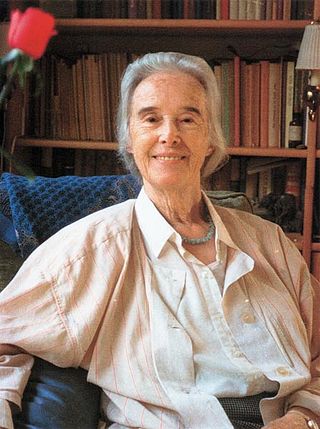Related Research Articles

Ita Wegman co-founded Anthroposophical Medicine with Rudolf Steiner. In 1921, she founded the first anthroposophical medical clinic in Arlesheim, known until 2014 as the Ita Wegman Clinic. She also developed a special form of massage therapy, called rhythmical massage, and other self-claimed therapeutic treatments.

Paul Nordoff was an American composer and music therapist, anthroposophist and initiator of the Nordoff-Robbins method of music therapy. His music is generally tonal and neo-Romantic in style.
Peter Selg is a German psychiatrist. He was born in Stuttgart and studied medicine in Witten-Herdecke, Zurich, and Berlin. Until 2000, he worked as the head physician of the juvenile psychiatry department of Herdecke hospital in Germany. Selg is director of the Ita Wegman Institute for Basic Research into Anthroposophy and professor of medicine at the Alanus University of Arts and Social Sciences (Germany). He lectures extensively and is the author of numerous books.
Herbert Hahn was a German teacher and Anthroposophist.
Francis Edmunds was an educator and Anthroposophist and the founder of Emerson College, Forest Row who was born in Vilnius, Lithuania and died in Forest Row, East Sussex.
Thomas Weihs was an Austrian doctor and special needs educator, one of the founders of the Camphill Movement and a pioneer of Anthroposophical curative education.

Valborg Werbeck-Svärdström was a Swedish singer, voice teacher, and anthroposophist.
John Charles Davy was a British journalist and science editor for The Observer, lecturer, vice-principal of Emerson College and Anthroposophist.

Alfred Rexroth was a German engineer, entrepreneur and anthroposophist. He was the director of several business enterprises including the companies Neuguss, Rhinow and his family concern Rexroth, today Alfred Rexroth. Through the donation of his fortune the GLS Bank was able to begin much of its work.
Ernst Weissert, born 20 July 1905 in Mannheim Germany and died 2 January 1981 in Stuttgart was a teacher, general secretary of the Anthroposophical Society in Germany and co-founder and director of the Bund der Freien Waldorfschulen, the Hague Circle and the Friends of Waldorf Education.
Michael Wilson, was a musician, curative educator, scientist, translator and General Secretary of the Anthroposophical Society in Great Britain
Rudi Lissau, born 26 June 1911 in Vienna and died 30 January 2004 in Brookthorpe, United Kingdom, was a Steiner school teacher, author, lecturer and anthroposophist.
Margaret Bennell was a Steiner school teacher, co-founder of Wynstones School in Gloucestershire and founder of Hawkwood College in Stroud.
Eileen Morley Hutchins was a Steiner school teacher, writer and founder of the Elmfield Rudolf Steiner School in Stourbridge.
Eleanor Merry, was an English poet, artist, musician and anthroposophist with a strong Celtic impulse and interest in esoteric wisdom. She studied in Vienna and met Rudolf Steiner in 1922 after becoming interested in his teachings. She went on to organize Summer Schools at which Steiner gave important lectures, and was secretary for the World Conference on Spiritual Science in London in 1928.
Sunfield is a private special school, Children's Home and charity on the border of Worcestershire and the West Midlands in England. It was founded in 1930 and now supports boys and girls, aged 6 – 19 years, with complex learning needs, including autism.
George Adams Kaufmann, also George Adams and George von Kaufmann, was a British mathematician, translator and anthroposophist. He travelled widely, spoke several languages and translated many of Rudolf Steiner’s lectures into English. Through his studies in theoretical physics, he contributed to the expansion and development of the natural sciences as extended by the concepts of anthroposophy.

Liane Collot d'Herbois was a British painter and anthroposophical painting therapist. She researched light, dark, colour and their application in painting and therapy.

Carlo Pietzner (1915-1986) was a co-founder of Camphill, artist, anthroposophist, and a special needs and adult educator.
Frederik Willem Zeylmans van Emmichoven, was a Dutch psychiatrist and anthroposophist. From 1923 until his death in 1961 he was chairman of the Dutch Anthroposophical Society. He was a familiar figure in public life and had a considerable influence on the anthroposophic movement, particularly through his numerous lectures and his work as an author, which included the first biography of Rudolf Steiner.
References
- ↑ Biographien Dokumentation der Forschungsstelle Kulturimpuls retrieved 2014.09.13
- ↑ Lady Cynthia Chance, The Progonion - Family Memoires retrieved 2014.09.13
- ↑ Lady Cynthia Chance, The Progonion - Family Memoires retrieved 2014.09.13
- ↑ Biographien Dokumentation der Forschungsstelle Kulturimpuls retrieved 2014.09.13